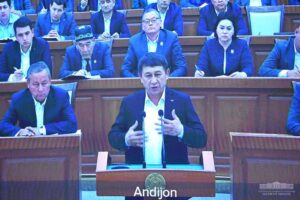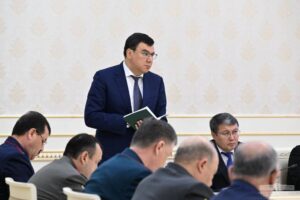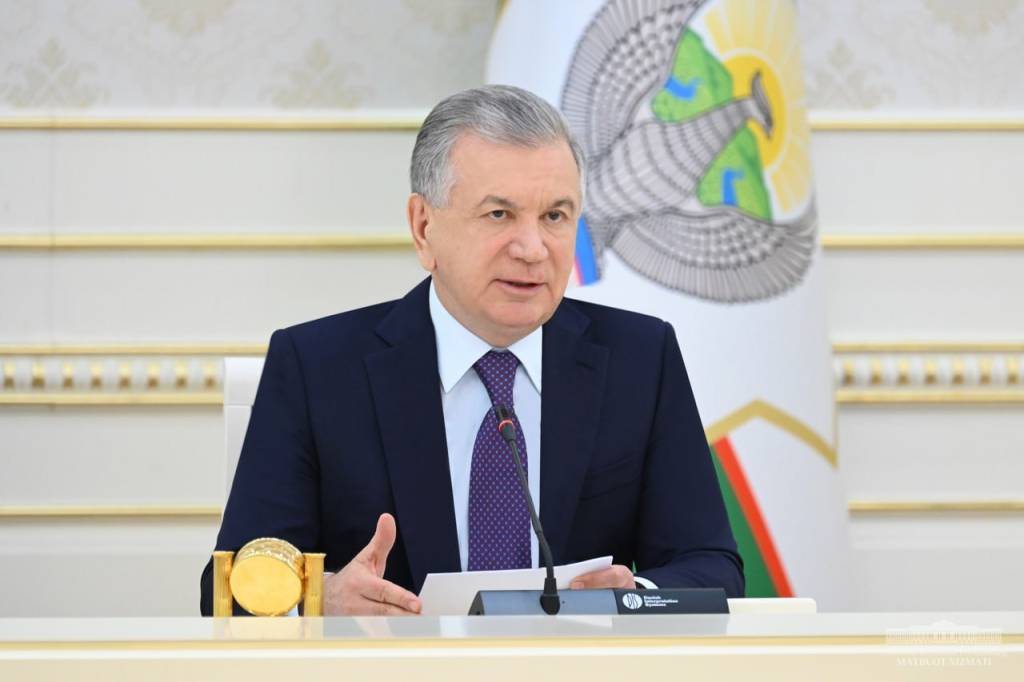WNAM MONITORING: President Shavkat Mirziyoyev chaired a meeting on implementing the “Yashil Makon” (Green Space) project and improving waste management.
As part of the project, 125 million seedlings are planned to be planted this spring. In the regions, work has begun to create parks and plant trees along roads in ten rows. The work progress in Karakalpakstan, Kashkadarya, and Namangan regions was exemplary.
However, in most regions and districts, land plots for planting trees have not yet been identified, and funds have not been allocated for irrigation and seedlings.
In this regard, yesterday, the Cabinet of Ministers critically reviewed this issue. As a result, disciplinary sanctions were applied to 28 officials – regional and district hokims, their deputies, and heads of system organizations.
Not all ministries and agencies take a responsible approach to landscaping. For example, the Ministry of Defense created a park of 100 hectares, the Ministry of Digital Technologies, and the Ministry of Mining and Geology – 65 hectares. However, tree planting has not been completed on lands allocated to the Ministries of Energy and Transport. Much land remains unused along roads and railways, rivers and canals, industrial enterprises, and gas stations.
There is a lack of initiative and outreach for mass tree planting. It was emphasized that if government organizations, local councils, the Eco-Party, other associations, and mahallas are actively involved in the process, many parks can be created.
The following tasks and new initiatives within the framework of the “Yashil Makon” project were discussed at the meeting.
Many of our compatriots want to plant trees and create green areas, but residents of multi-storey buildings do not have enough land for this. In this context, an initiative has been launched in Tashkent region, based on the experience of South Korea, according to which land from the district fund is transferred to improvement departments for 30 years. At the expense of the local budget, a drip irrigation system is being introduced, and the land is being prepared for planting, after which all interested residents are invited to plant trees. Each tree is marked with the name of the person who planted it. A landscaping department employee is assigned to care for the trees.
The Head of state instructed to implement this experience in all areas.
Uzbekistan has 9,452 mahallas and 39,900 multi-storey buildings in cities. It was emphasized that mahalla activists and management service companies should actively participate in planting trees.
There is a system in place whereby land along roads and canals is provided to interested parties based on a direct contract for ten years with an obligation to plant trees in five rows. This allows for creating many new forest plantations in the current season.
In Tashkent, the following experience is used to increase green areas: the city planning council requires that at least 30 percent of the territory be allocated for planting trees in new construction projects, even specifying what types of seedlings should be used. The facility can be put into operation only after this condition is met.
The Ministry of Construction was tasked with expanding this practice to all regions by including a tree-planting obligation in urban planning standards and licensing requirements.
In particular, it was determined that this year, as part of the construction of 2.5 thousand multi-storey buildings, green alleys should be organized on 30 percent of the adjacent territory and at least 1 hectare in each of the 38 New Uzbekistan neighborhoods.
The Ministry of Ecology, Environmental Protection and Climate Change has been tasked with organizing 444 green gardens and 160 public parks locally and launching the “My Garden” project.
Responsible persons presented information on plans to create green areas along fields, around large enterprises, and in industrial zones.
The practice of free delivery of seedlings to social institutions will continue. This year, more than 4 million seedlings will be distributed to them.
Issues of organizing a waste management system based on new approaches were also discussed at the meeting.
As noted, a completely new system of improvement and cleanliness will be introduced in the regions. From May 1, in two districts of each region, on an experimental basis, the functions of improvement departments will be transferred to private partners specializing in waste management.
As part of this initiative, entrepreneurs will be involved in planting trees and flowers, caring for them, cleaning canals, lighting streets, and removing waste. Funds allocated annually from the budget to improvement departments will now be directed to these enterprises.
If the experiment shows its effectiveness, in 2025, it will be extended to all districts and cities.
There will be a separate system for Tashkent. Starting April 15, the tasks of the metropolitan area improvement departments for street cleaning, landscaping, and road maintenance will be auctioned and transferred to private partners.
A new system for regulating waste sites and recycling will also be introduced. In each region, 3-4 conveniently located landfills will be converted into special eco-industrial zones to implement recycling projects, and the remaining ones will be used as temporary waste collection and transfer sites.
Landfills that have exhausted their service life will be closed. Poplars, mulberries, maples, and elms will be planted around them, and green belts will be created.
Payment discipline is also necessary to improve waste removal services. In this regard, a new procedure will be introduced, according to which the “mahalla of seven” will be given the right not to consider non-existent debts for services not provided on their territory. This will help prevent the unfair practice of recording accounts receivable for services not provided.
A system will be introduced to encourage apartment building residents to sort waste before recycling it. As part of this system, special garbage bags will be provided free of charge at the expense of the Ecology Fund, and residents will separate waste into categories and deliver it to collection points. Entrepreneurs will buy recyclable waste from the population.
In the first stage, this system will be launched in the cities of Tashkent, Andijan, Bukhara, Termez, Angren, and Tashkent district.
At the meeting, reports from responsible persons on the issues discussed were heard.


